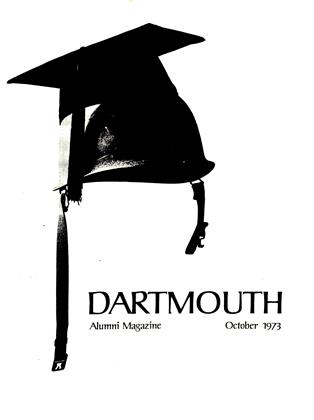By A lien F.Davis '53. New York: Oxford University Press,1973. 339 pp. $10.95.
The woman best remembered in American history is Jane Addams (1860-1935), even though she led no important movement for social transformations, but accepted traditional American ideals and viewed women primarily as mothers and housekeepers who had greater sympathy than men for the poor and oppressed. She loved feminine things like pretty clothes. Politically a Republican, religiously she was rather vague. Her favorite book was Louisa May Alcott's LittleWomen. She has received much biographical attention, mainly to explain her tremendous reputation, but unfortunately biographers tend to disagree with one another, and Jane's own voluminous writing and public speeches give little help because she contradicted herself frequently. The present book tries to make her understandable.
She came from a small town in northern Illinois, where her father, well-to-do and politically important, was conservative and domineering, and so was his second wife (Jane's mother died when she was a trifle over two). It follows that Jane grew up a conservative. She preferred chastity for both sexes and never showed any romantic interest in a particular man.
Jane's background was unusual. Her father was comparatively wealthy, and ended his life with about a quarter of a million dollars. Thus his daughter enjoyed unusual financial freedom. Frequent illness limited her activities and caused her to be somewhat pampered. Extremely conscientious and hard-working in spite of her poor health, she proved to be an indefatigable writer and public speaker.
Her educational goal was Smith College, but her father found Northampton too remote and kept her nearer home. She also hoped for medical training but managed only a short period in Philadelphia. She traveled much in Europe and was particularly impressed by Toynbee House. She and several friends concluded that a similar philanthropic institution was possible for the slums of Chicago.
Buying a rundown building, the ladies set to work. Their first goal was to stress education, even to the college level, but soon such other activities as technical training, art, a kindergarten, and a nursery were added. Hull House was well received by both the wealthy and the general public, and similar institutions soon appeared throughout the United States. The country revered June almost as if she were a saint, and her speeches and books were sacrosanct.
Jane Addams' most unhappy period came with World War I, which touched her very deeply. She pleaded unsuccessfully with President Wilson to arrange a conference to end the war. She was involved with Henry Ford and his peace ship and planned to accompany him, but she was forced to abandon the trip because of illness.
Pacificism aroused great resentments in World War I, and Jane Addams was insulted with such offensive names as traitor, communist, and anarchist and labelled the most dangerous woman in America.
Luckily, the attitude of the United States changed in the later 1920s and 1930s when Jane had, retired from Hull House. After her death from cancer in 1935, she was given high praise and even adulation and is now considered a heroine of the first rank.
Dartmouth Professor of History, Emeritus, Mr.Riegel, a specialist in the American West, isauthor of American Feminists, (1963).
 View Full Issue
View Full Issue
More From This Issue
-
 Feature
FeatureCITIZEN SOLDIERS
October 1973 By LAURENCE I. RADWAY -
 Feature
FeatureONE HUNDRED MASTER DRAWINGS
October 1973 By ROBERT B. GRAHAM '40 -
 Feature
FeaturePeregrine Summer
October 1973 By James T. Harris '72 -
 Feature
FeatureArcheological "Amateur"
October 1973 -
 Feature
FeaturePort Professional
October 1973 By M.B.R. -
 Article
ArticleBig Green Teams
October 1973 By JACK DEGANGE
ROBERT E. RIEGEL
-
 Books
BooksTraining in Citizenship
APRIL, 1927 By Robert E. Riegel -
 Books
BooksTHE EPIC OF INDUSTRY
JUNE, 1928 By Robert E. Riegel -
 Article
ArticleTHE DAY OF THE CATTLEMAN
MARCH 1930 By Robert E. Riegel -
 Article
ArticleThe New Social Science Program
January 1937 By ROBERT E. RIEGEL -
 Books
BooksCOUNCIL FIRES ON THE UPPER OHIO
January 1941 By Robert E. Riegel -
 Books
BooksAMERICAN HISTORY.
December 1961 By ROBERT E. RIEGEL
Books
-
 Books
BooksFaculty Publications
January 1936 -
 Books
BooksACTING PROFESSIONALLY: RAW FACTS ABOUT ACTING AND THE ACTING BUSINESS.
NOVEMBER 1972 By ERIC FORSYTHE '69 -
 Books
BooksTHE COURT OF VENUS.
May 1956 By L.D. PEARSON -
 Books
BooksTHE UNITY OF THE WORLD
JUNE 1930 By Luther H. Evans -
 Books
BooksECONOMICS IN A NUTSHELL
February 1934 By R. V. Leffler -
 Books
BooksPROCEEDINGS OF THE SECOND N. H. BANK MANAGEMENT CONFERENCE
October 1941 By William A. Carter '20.


